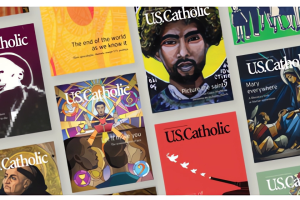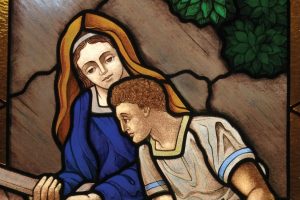While speaking to American bishops during their ad limina visit to Rome this past weekend, Pope Benedict XVI called for more strict oversight of Catholic colleges and universities in the United States, expressing his concern over "apparent dissidence between some representatives of Catholic institutions and the church's pastoral leadership."
The timing is more than coincidental, as it comes during the season when watchdogs are keeping close tabs on who Catholic universities are inviting to speak at commencement ceremonies. Two Jesuit schools have already faced pressure this year, with petitions calling for Gonzaga University to rescind an invitation to Archbishop Desmond Tutu and Georgetown University igniting a firestorm by announcing HHS Secretary Kathleen Sebelius as one of its commencement speakers. That announcement came just over a week after Rep. Paul Ryan spoke at Georgetown after dismissing letters from the U.S. bishops and openly disagreeing with the church hierarchy over the interpretation of Catholic teaching.
So Pope Benedict is calling for bishops to have more direct oversight of Catholic universities to ensure they are not drifting away from Catholic teaching. That position sounds somewhat familiar. It was just last month that the Vatican issued a call for reform of the Leadership Conference of Women Religious in the United States over doctrinal concerns, putting U.S. bishops in charge of the reform process.
Just last week, the Vatican announced it was strengthening its oversight of Caritas Internationalis, the church's official humanitarian aid and development agency, due to concerns over its Catholic identity. Vatican officials will be tasked with doing the overseeing. Those of us in communications are being watched as well, as last month Cardinal Raymond Burke said the church must ensure that the work of Catholic communicators is "free from doctrinal and theological error," according to Catholic News Service. And guess who is responsible for making sure that happens? Priests and the local bishop, of course.
Do you happen to notice a pattern emerging here?
It seems that no one is safe from Vatican scrutiny these days. And all of these calls for more oversight of Catholic groups have come in under three weeks, so this may only be the tip of the iceberg. Add in Pope Benedict's warnings to those who dissent from church teaching in his Holy Thursday message and one can only wonder who will be targeted next (I'd wager a guess for Catholic hospitals, since they've already had their share of scrutiny in the U.S.).
Putting aside the question of whether the already busy bishops have the time or the desire to take on more administrative work, is such strong oversight by the church hierarchy of Catholic groups and organizations really needed? When an individual or organization takes opposition to a specific church teaching or position, there may be need for correction (preferably in private). But for the most part, I'd like to believe that those who take on the work of leading Catholic institutions or serving in our ministries can be trusted to do their jobs and bring their own ideas to the table–without being under the watchful eye of the bishops.













